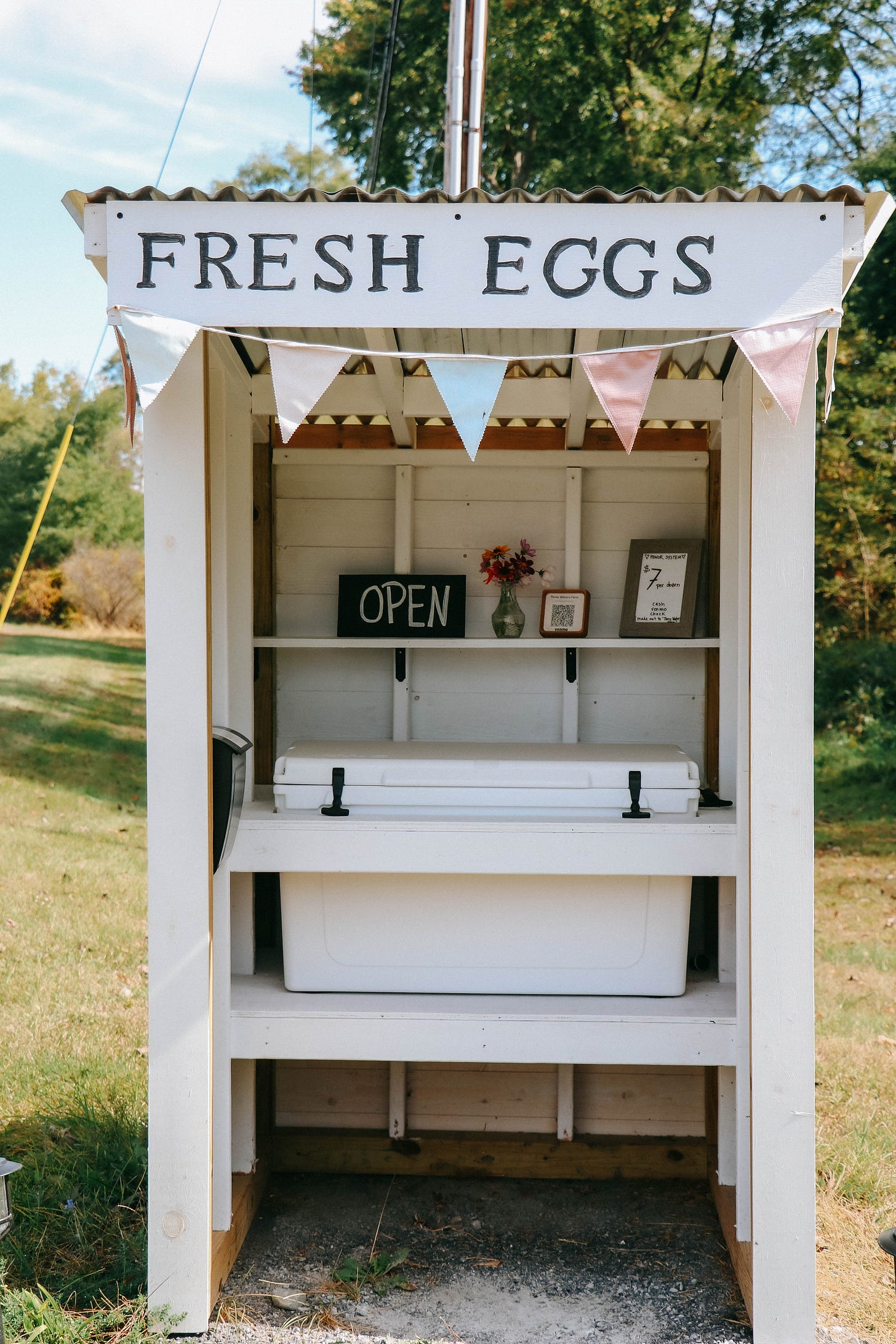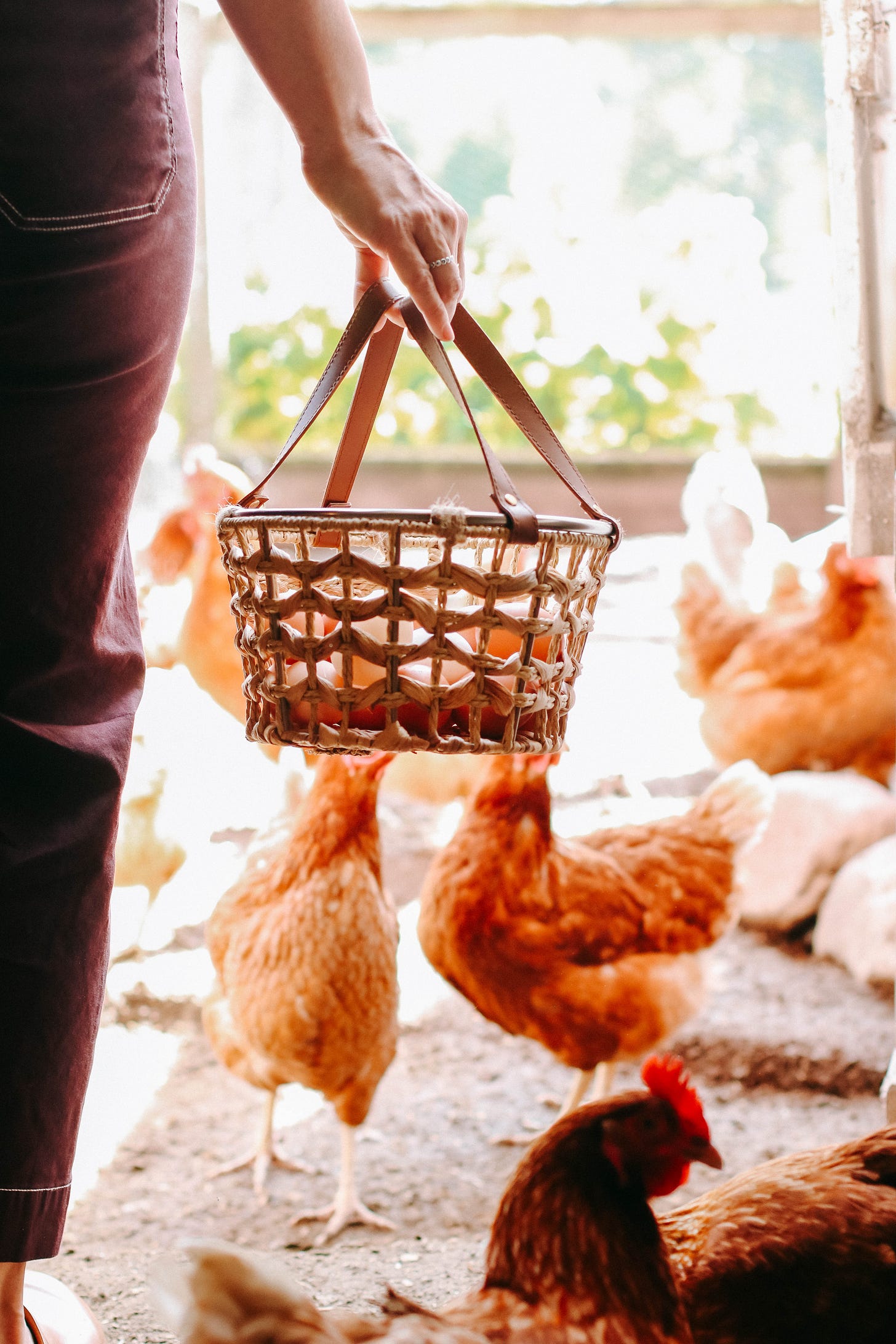The Community Economics of a Roadside Farmstand
What we learned in the first year of operating our honor system farmstand
At the end of our driveway, on a busy county road, sits a cooler filled with eggs in a rainbow of colors - white, light brown, and the occasional surprise of blue. A handpainted sign invites passersby to take what they need and leave payment in a small lockbox.
We are preparing to reopen our farmstand at the end of this month, and while this simple wooden structure might seem inconsequential in the grand scheme of agriculture and economics, to me it represents something profound: a small but meaningful experiment in bioregional living and community trust.
The honor system farmstand operates on a premise that feels almost radical in today's world: "I trust you, please treat me with care."
The honor system itself is a quiet rebellion against the transactional nature of modern commerce. It's an assertion that even when we don't see each other face-to-face, we can still choose to interact with kindness and integrity. Each egg purchased represents a small vote of confidence in our shared community values.
This asynchronous relationship may lack face-to-face interaction, but it fosters connection nonetheless. Each time someone stops, selects their eggs, and leaves behind the correct payment, a thread of community is strengthened. Each exchange says: we can still trust one another, even when no one is watching.
Our first year operating the farmstand was filled with lessons. I learned about the practicalities: the need for a seller's permit after the fact (thankfully, our building inspector—himself a homesteader across the street—guided me through the process after-the-fact), the importance of changing ice frequently on hot days, and the rhythm of sales (weekends bringing a rush of both locals doing grocery shopping and curious tourists exploring country roads).
I discovered the economic realities: that word-of-mouth takes time to build, that my small flock couldn't keep up with demand by season's end, and that even during last year's egg shortage due to Avian Flu, maintaining consistent, fair pricing felt more aligned with my values than capitalizing on scarcity.
My current operation reveals the delicate balance of small-scale farming. Of our 42 total laying hens, 30 Red Ameraucanas actually belong to our partner, Grimaldi Farms. We raise their chickens, sell the eggs back to them wholesale, and they market them under their brand at farmers markets and their farm store. This arrangement provides guaranteed income, even though it leaves just 12 hens producing for our own farmstand.
With 6 White Leghorns and 6 Lavender Orpingtons (plus one rooster keeping watch), we currently produce about ~12 eggs daily. After setting aside a dozen weekly for our family and another for my parents, we're left with just 4-5 dozen weekly to sell. Last year, we proudly made $726.43 from farmstand egg sales over the 5 months it was open.
This year, I've added six Olive Egger chicks to the mix, hoping to delight customers with beautiful green hued eggs by mid-summer. Though they're "straight run" (unsexed), meaning some might turn out to be roosters rather than laying hens, I'm optimistic about increasing production.
If you’re wondering what we’ll do with any extra roosters, the answer is: soup.
With limited capacity to expand our chicken operation immediately, this season will see our farmstand diversify. If all goes well, we'll add wildflower honey, cut flower bouquets, fruit preserves, and fresh produce from our garden.
I'm also planning on investing in better signage - enlisting a local artist to create something more vibrant and legible than my hand-painted "Fresh Eggs" sign, something eye-catching enough to entice drivers to pull over on a Sunday afternoon impulse.
Our little farmstand continues to be an experiment in bioregionalism—a philosophy that reconnects us to the place we live and the people who share it. By producing food on our land and sharing it with our immediate community, we're shortening supply chains, reducing transportation impacts, and creating resilience.
But perhaps more importantly, we're demonstrating an alternative way of being in relationship with our neighbors and our land. The farmstand says: here is something we've grown with care; we trust you to value it fairly. In a world of increasing disconnection, this small act of faith feels revolutionary.
While the financial returns remain modest, the other rewards—community connections, the pride of producing food, the joy of sharing abundance, and the satisfaction of living our values—make our farmstand a deeply satisfying venture worth continuing and expanding.






